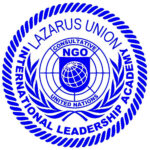THE UNIFORM
The Lazarus Union, as an international non-governmental organization (NGO), adopts the practice of wearing uniforms for several reasons, particularly in the context of its involvement in international missions. Here’s a detailed explanation:
- Identity and Recognition: Uniforms serve as a visual symbol of the organization’s identity and purpose. By wearing a distinctive uniform, members of the Lazarus Union can be easily recognized, both by other members and by individuals in the communities they serve. This fosters a sense of unity and cohesion among members, and it also helps to distinguish them from other organizations or individuals involved in similar activities.
- Professionalism and Credibility: Wearing uniforms can enhance the professionalism and credibility of the Lazarus Union, especially when operating in diverse and potentially challenging environments. A uniformed appearance conveys a sense of discipline, organization, and seriousness of purpose, which can be particularly important when working alongside or interacting with military, governmental, or other institutional actors.
- Safety and Security: In certain contexts, particularly in conflict zones or areas of instability, wearing uniforms can contribute to the safety and security of Lazarus Union members. A clearly identifiable uniform can help to mitigate the risk of confusion or mistaken identity, both for members themselves and for the individuals they are assisting or interacting with. This can reduce the likelihood of accidental harm or misunderstandings in high-pressure situations.

- Unity and Cohesion: Wearing uniforms can foster a sense of unity and cohesion among members of the Lazarus Union, regardless of their diverse backgrounds, nationalities, or roles within the organization. Uniforms create a sense of belonging and shared purpose, which can be particularly valuable in challenging or unfamiliar environments where teamwork and solidarity are essential.
- Logistical and Practical Considerations: Uniforms can also offer practical benefits in terms of coordination and organization. They can simplify the process of outfitting and equipping members for missions, ensuring that everyone has appropriate clothing and gear for the task at hand. Uniforms can also facilitate communication and coordination among team members, as they provide a common visual reference point.
- Respect and Recognition: Wearing uniforms can garner respect and recognition from local communities, governmental authorities, and other stakeholders. In many cultures, uniforms are associated with authority, expertise, and professionalism, which can open doors and facilitate cooperation with local partners and institutions. This can be especially important in contexts where trust and acceptance must be earned over time.
- Symbolism and Tradition: Finally, the practice of wearing uniforms may have symbolic significance within the Lazarus Union, reflecting its values, history, and traditions. Uniforms can serve as a tangible expression of the organization’s commitment to service, honor, and solidarity, drawing on military or ceremonial traditions that emphasize duty, sacrifice, and collective action.
In conclusion, the Lazarus Union’s decision to wear uniforms as an international NGO engaged in various missions reflects a combination of practical, symbolic, and strategic considerations. Uniforms contribute to the organization’s identity, professionalism, and safety, while also fostering unity, respect, and recognition among members and external partners.



